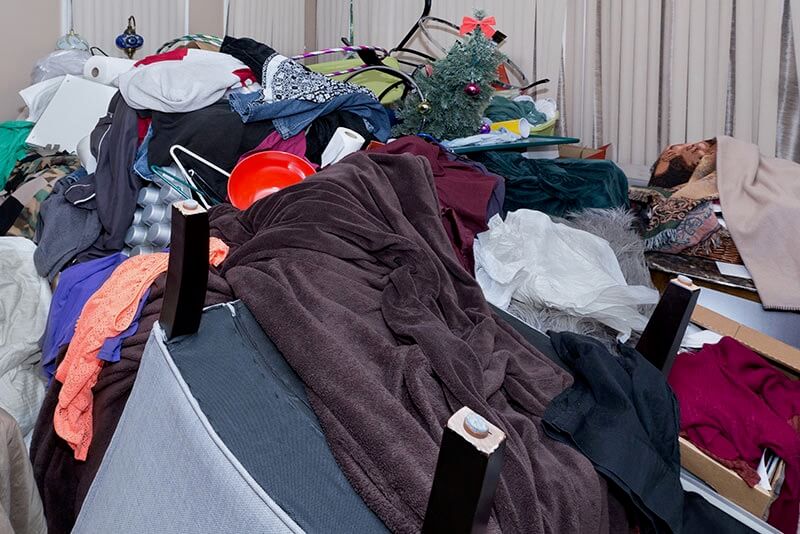BLOG

Signs Of A Hoarding Disorder & How You Can Help
A hoarded property can be a somewhat challenging situation to deal with for everyone involved – from family and friends who are concerned and want to assist, to the person actually living in the hoarded property who may not be aware they have a problem.
For those who are looking to assist a hoarder, how can you tell whether you’re actually dealing with a hoarder clean up situation (vs ordinary clutter) and what are some ways in which you can provide assistance? Read on to find out more about hoarding and how you can best help a hoarder when it comes to their hoarding situation.
What Is Hoarding?
People with a hoarding disorder have persistent difficulty with throwing away or letting go of their possessions because of a perceived need to save these items for later. People with hoarding disorders will often exhibit signs of distress at the prospect of having to discard their belongings, which then usually leads to an accumulation of possessions and rubbish that clutter the person’s home and living space.
What Are Some Signs & Symptoms Of A Hoarding Disorder?

People who hoard tend to exhibit or experience the following:
• Inability to dispose of possessions including rubbish or things of little monetary value or usefulness.
• Feeling extremely distressed at the thought of, or when actually disposing of their belongings.
• Living in a place where the sheer volume of clutter has taken over the main living spaces rendering them unliveable and also potentially dangerous.
• Continuing to hoard items even though there is no more available space.
• Uncertainty about how to organise their possessions.
• Having a strained relationship with family and friends regarding their hoarding habits.
• They have an underlying mental health issue such as anxiety, a personality disorder or experience depression.
Hoarding vs Collecting, What’s The Difference?
Many people collect all sorts of things as a hobby for various reasons including to make a profit, for sentimental reasons or simply just for pleasure. Collecting differs to hoarding in that collecting is done so in an organised and systematic way unlike hoarding.
Collectors tend to keep their collections organised and displayed in a particular way in a designated area of their home. People with a hoarding disorder on the other hand often live in squalor with their possessions surrounding them and blocking off most areas of their living space – rendering their home unsafe, unusable and oftentimes unsanitary.
What Do People Hoard?

Hoarders tend to gather and hang on to just about anything. Some common things people with a hoarding disorder tend to accumulate in their living spaces include:
• Paper, magazines and newspapers
• Clothing
• Knick-knacks
• Kitchenware
• Books
• Brochures
• Bills and receipts
• Containers
• Items with sentimental value that have been handed down
Ways You Can Help A Hoarder

Hoarders don’t often realise they have an underlying problem, which is why they tend to struggle with family and friends who express concern and try to assist. If you have a person with hoarding disorder in your life and you would like to offer some help, here are some ways you can do so:
• Earn their trust – be sure to communicate openly about your desire to help as well as how you will be assisting. A person suffering from hoarding disorder can oftentimes feel a distrust for others and feel emotionally vulnerable, so it’s important to show your support.
• Don’t enable the behaviour – try to avoid contributing to the problem by doing things like gifting a hoarder with more possessions or perhaps inviting them out for a day of shopping.
• Let them know you care – show the hoarder in your life that you’re here to assist because you truly care about their wellbeing. Express your feelings about how much you love and care about them.
• Ask for professional help – don’t be afraid to seek help from professional therapists that specialise in treating hoarding behaviours to get your loved one the help that they need. If you need a hand with cleaning, reach out to an experienced and compassionate hoarding clean up company to assist with getting the cleaning done safely and in a timely manner.
Professional Cleaning To Help A Hoarder
For all your professional squalor and hoarding cleaning needs, call the experienced and compassionate team at National Trauma (NTCSC). With a nationwide service and over 30 years in the professional biohazard cleaning industry, you’ll know you’re in great hands with us.
Call our team anytime 24/7 to discuss your professional hoarding cleaning needs and we’ll be glad to assist.

